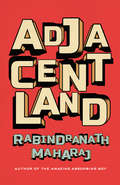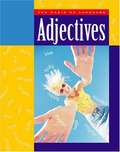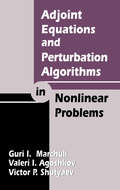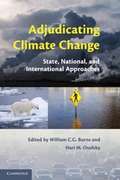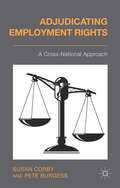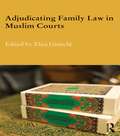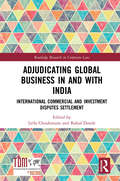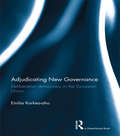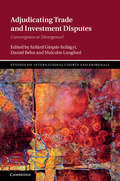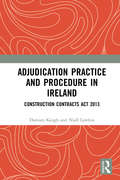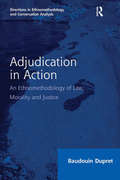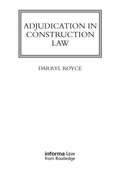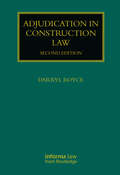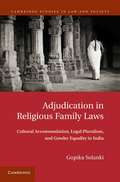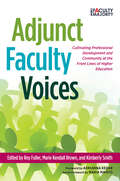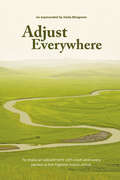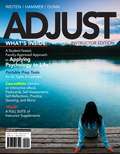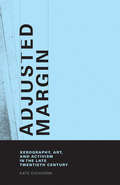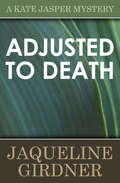- Table View
- List View
Adjacentland
by Rabindranath MaharajToday is a new day but yesterday was the same day. A man awakens with no memory in a strange, rundown institution. Struggling to make sense of his surroundings, he begins to piece together the story of his life from clues someone has left for him—drawings that line the walls of his room and fragments of letters hidden in the lining of his jacket. When he leaves his room to venture into the surrounding Compound, he encounters a group of oddly familiar people that urge him to undertake a desperate mission. In dreamlike prose, award-winning novelist Rabindranath Maharaj weaves a story of fragments in which our narrator comes to believe he was once a comic book writer who warned against humanity's reliance on artificial intelligence. Meanwhile, his caretakers try to convince him he's insane. Soon he uncovers more clues that suggest memory is stored outside the body, and he learns of Adjacentland, a primitive land of outsiders where human imagination still survives. Together with a motley group of inmates from the Compound, he decides he must make his way there. In this brilliant, unsettling novel, Maharaj asks us, "What happens to the soul when all minds are tied together?"
Adjectives (The Magic of Language)
by Ann HeinrichsWhat is your favorite kind of book? Is it thick or thin? Long or short? If your favorite books are fun, colorful, and helpful, then this is the right book for you. You will discover the interesting and exciting world of adjectives! Learn what they are, where they go, and how to use them. Adjectives are great!
Adjoining Rooms
by Alex WintersOne kiss tore them apart. Will a second bring them back together?Knox Townsend can hardly believe it when he walks into Playgroundz Café to find his old high school crush, Trevor Channing, working the cash register. Once upon a time, the two shared a smoldering, passionate kiss while their prom dates were passed out ... and never spoke of it again. Now Knox is back in town for the next week to upgrade the café’s coffee machines. But the only thing he really wants to upgrade are his feelings for Trevor, long simmering and now reignited. This time, hopefully for good!Trevor hasn’t seen Knox since he left town right after graduation without so much as a backward glance. Suddenly he’s Trevor’s boss and staying at the same hotel where they’d shared their first, and only, kiss. One of the front desk clerks is Trevor’s regular customer and, for a few gift cards, Trevor checks into the room next door to Knox’s. The room with the adjoining doors he plans to keep unlocked all week, just in case!
Adjoint Equations and Perturbation Algorithms in Nonlinear Problems
by Guri I. Marchuk Valeri I. Agoshkov Victor P. ShutyaevSparked by demands inherent to the mathematical study of pollution, intensive industry, global warming, and the biosphere, Adjoint Equations and Perturbation Algorithms in Nonlinear Problems is the first book ever to systematically present the theory of adjoint equations for nonlinear problems, as well as their application to perturbation algorithms. This new approach facilitates analysis of observational data, the application of adjoint equations to retrospective study of processes governed by imitation models, and the study of computer models themselves. Specifically, the book discusses: Principles for constructing adjoint operators in nonlinear problemsProperties of adjoint operators and solvability conditions for adjoint equationsPerturbation algorithms using the adjoint equations theory for nonlinear problems in transport theory, quasilinear motion, substance transfer, and nonlinear data assimilationKnown results on adjoint equations and perturbation algorithms in nonlinear problemsThis groundbreaking text contains some results that have no analogs in the scientific literature, opening unbounded possibilities in construction and application of adjoint equations to nonlinear problems of mathematical physics.
Adjoint Topology Optimization Theory for Nano-Optics
by Yongbo DengThe book focuses on the topology optimization method for nano-optics. Both principles and implementing practice have been addressed, with more weight placed on applications. This is achieved by providing an in-depth study on the major topic of topology optimization of dielectric and metal structures for nano-optics with extension to the surface structures for electromagnetics. The comprehensive and systematic treatment of practical issues in topology optimization for nano-optics is one of the major features of the book, which is particularly suited for readers who are interested to learn practical solutions in topology optimization. The book can benefit researchers, engineers, and graduate students in the fields of structural optimization, nano-optics, wave optics, electromagnetics, etc.
Adjudicating Climate Change: State, National, and International Approaches
by William C. G. Burns Hari M. OsofskyCourts have emerged as a crucial battleground in efforts to regulate climate change. Over the past several years, tribunals at every level of government around the world have seen claims regarding greenhouse gas emissions and impacts. These cases rely on diverse legal theories, but all focus on government regulation of climate change or the actions of major corporate emitters. This book explores climate actions in state and national courts, as well as international tribunals, in order to explain their regulatory significance. It demonstrates the role that these cases play in broader debates over climate policy and argues that they serve as an important force in pressuring governments and emitters to address this crucial problem. As law firms and public interest organizations increasingly develop climate practice areas, the book serves as a crucial resource for practitioners, policymakers, and academics.
Adjudicating Employment Rights
by Susan Corby Pete BurgessAdjudicating Employment Rights compares and analyses institutions for resolving employment rights disputes in ten countries. In addition to detailed individual chapters, the study offers a theoretical perspective and an evaluation of national institutions against key yardsticks.
Adjudicating Family Law in Muslim Courts: Cases From The Contemporary Muslim World (Durham Modern Middle East and Islamic World Series)
by Elisa GiunchiWhile there are many books on Islamic family law, the literature on its enforcement is scarce. This book focuses on how Islamic family law is interpreted and applied by judges in a range of Muslim countries – Sunni and Shi'a, as well as Arab and non-Arab. It thereby aids the understanding of shari'a law in practice in a number of different cultural and political settings. It shows how the existence of differing views of what shari'a is, as well as the presence of a vast body of legal material which judges can refer to, make it possible for courts to interpret Islamic law in creative and innovative ways.
Adjudicating Global Business in and with India: International Commercial and Investment Disputes Settlement (Routledge Research in Corporate Law)
by Leïla Choukroune and Rahul DondeThis edited collection on international commercial and investment disputes in, and with, India examines past and present landmark legislative and regulatory reforms initiated by the Indian government, including the 2015 new Bilateral Investment Treaty (BIT) model, the 2015 amendments to the 1996 Arbitration Act and the 2013 amendments to Section 135 of the Companies Act on Corporate Social Responsibility (CSR), as well as the most recent amendments to the same. The book also includes recent developments in the dispute resolution arena, regional, and international negotiations involving India, the legal profession’s response to these developments, and civil society’s comments. In addition, it addresses contemporary problems of key importance and at the centre of today’s discussions, from the legitimacy and relevance of Investor–State Dispute Settlement (ISDS) to the denunciation of Bilateral Investment Treaties (BITs), and the role arbitration should play in emerging economies now leaders in world trade. In creating bridges between commercial and investment arbitration, it also renews the conceptual approach to these too often artificially isolated fields of law. The volume provides an accurate and updated account of the many fascinating conceptual and practical evolutions, which already impact the world of international dispute resolution far beyond the borders of India. This unique and exhaustive study will be of great appeal to a vast range of readers from practitioners to academia.
Adjudicating New Governance: Deliberative Democracy in the European Union
by Emilia Korkea-ahoThis book engages with and advances the current debate on new governance by providing a much-needed analysis of its relationship with the courts. New modes of governance have produced a plethora of instruments and actors at various levels that present a challenge to more traditional forms of command-and-control regulation. In this respect, it is commonly maintained that new governance generally – and political experimentation more broadly – weakens the power of the courts, producing a legitimacy problem for new forms of governance and, perhaps more fundamentally, for law itself. Focusing on the European Union, this book offers a new account of the role of the courts in new governance. Connecting new governance with the conception of deliberative democracy, this book demonstrates how the role of courts has been transformed by the legal and political experimentation currently taking place in the European Union. Drawing on a series of case studies, it is argued that, although deliberations in governance frameworks provide little by way of hard, binding law, these collaborative frameworks nevertheless condition judicial decision making. With far-reaching implications for how we understand the justiciability of ‘soft law’, participation rights, the legitimacy of governance measures, and the role of courts beyond the nation-state, this book argues that, far from undermining the power of the courts, governance regimes assist their functioning. Its analysis will therefore be of considerable interest for lawyers, political scientists and anyone interested in the transformation of the judiciary in the era of new governance.
Adjudicating Refugee and Asylum Status
by Benjamin N. Lawrance Galya RufferIn this book, an array of legal, biomedical, psychosocial, and social science scholars and practitioners offer the first comparative account of the increasing dependence on expertise in the asylum and refugee status determination process. This volume presents a comprehensive study of the relevance of experts, as mediators of culture, who are called upon to corroborate, substantiate credibility, and serve as translators in the face of confusing legal standards that require proof of new forms and reasons for persecution around the globe. The authors draw upon their interactions with expertise and the immigration process to provide insights into the evidentiary burdens on asylum seekers and the expanding role of expertise in the forms of country-conditions reports, biomedical and psychiatric evaluations, and the emerging field of forensic linguistic analysis in response to emerging forms of persecution, such as gender-based or sexuality-based persecution. This book is essential reading for both scholars interested in the production of knowledge and clinicians considering the role of experts as mediators of asylum claims.
Adjudicating Trade and Investment Disputes: Convergence or Divergence? (Studies on International Courts and Tribunals)
by Malcolm Langford Gáspár-Szilágyi Szilárd Daniel BehnRecent trends suggest that international economic law may be witnessing a renaissance of convergence – both parallel and intersectional. The adjudicative process also reveals signs of convergence. These diverse claims of convergence are of legal, empirical and normative interest. Yet, convergence discourse also warrants scepticism. This volume contributes to both the general debate on the fragmentation of international law and the narrower discourse concerning the interplay between international trade and investment, focusing on dispute settlement. It moves beyond broad observations or singular case studies to provide an informed and wide-reaching assessment by investigating multiple standards, processes, mechanisms and behaviours. Methodologically, a normative stance is largely eschewed in favour of a range of 'doctrinal,' quantitative and qualitative methods that are used to address the research questions. Furthermore, in determining the extent of convergence or divergence, it is important to recognize that there is no bright line or clear yardstick for determining its nature or degree.
Adjudication Practice and Procedure in Ireland: Construction Contracts Act 2013
by Damien Keogh Niall LawlessThis adjudication textbook uniquely brings together a comprehensive analysis of, and commentary on, the Construction Contracts Act 2013 with a real-world perspective of adjudication, considering the knowledge, process and skills parties and adjudicators require in order to successfully participate in the adjudication process. Drawing on combined experience of 40 years in construction law, the authors provide invaluable guidance for all stakeholders in the adjudication process. The authors analyse and comment on the adjudication provisions of the Construction Contracts Act and describe prudent practice and procedure required to comply with Irish adjudication law, including case studies, case law and sample documentation for those to be involved as the parties, or those who want to act as adjudicators. Aimed at contractors, sub-contractors, developers, employers, construction, engineering and legal professionals and students, all of whom are either involved, or have an interest, in dispute resolution and adjudication.
Adjudication in Action: An Ethnomethodology of Law, Morality and Justice (Directions in Ethnomethodology and Conversation Analysis)
by Baudouin DupretAdjudication in Action describes the moral dimension of judicial activities and the judicial approach to questions of morality, observing the contextualized deployment of various practices and the activities of diverse people who, in different capacities, find themselves involved with institutional judicial space. Exploring the manner in which the enactment of the law is morally accomplished, and how practical, legal cognition mediates and modulates the treatment of cases dealing with sexual morality, this book offers a rich, praxeological study that engages with 'living' law as it unfolds in action. Inspired by Wittgenstein's later thought and engaging with recent developments in ethnomethodology and conversation analysis, Adjudication in Action challenges approaches that reduce the law to mere provisions of a legal code, presenting instead an understanding of law as a resource that stands in need of contextualization. Through the close description of people's orientation to and reification of legal categories within the framework of institutional settings, this book constitutes the first comprehensive study of law in context and in action.
Adjudication in Construction Law (Construction Practice Series)
by Darryl RoyceThis book brings together, in one convenient place, all the relevant material on the process of Adjudication in Construction. It will provide clarity for those involved in the adjudication process, or related proceedings, in the form of a detailed and reliable text that supports each proposition with a statutory provision or a judicial observation. Included in this book is a summary of the different procedures adopted in other jurisdictions, as well as a chronological account of the reviews and proposals for reforms made to Part II of the Housing Grants, Construction and Regeneration Act 1996. There is also an explanation of the payment procedures under the statutory framework. Finally, readers will be able to make use of appendices comprised of the statutory material, the various contractual adjudication procedures currently available, and necessary forms. Any lawyers or construction professionals involved in Adjudication will find this book to be a clear and comprehensive aid to their practice.
Adjudication in Construction Law (Construction Practice Series)
by Darryl RoyceThis book collects all the relevant material regarding the process of adjudication in construction. It provides clarity for those involved in the adjudication process or related proceedings with detailed and reliable analysis of them supported by statutory provisions and judicial observations. Adjudication in Construction Law discusses the role of ‘true value’ adjudications following smash and grab decisions on the basis of the absence of a pay less notice, the restraint of adjudication by injunction, hybrid contracts dealing with both construction operations and other operations and timing and content of payment notices and pay less notices. Additionally, this book includes a summary of the different procedures adopted in other jurisdictions, as well as an explanation of the payment procedures under the statutory framework. It also goes on to append all the relevant statutory material, contractual adjudication procedures and forms. A new feature of this edition is a detailed analysis and discussion of the development and of the ‘rules’ relating to the acceptability of a wrong answer provided that the right question has been dealt with, only one dispute being susceptible to adjudication and the necessity or otherwise of a dispute ‘arising under’ the construction contract. A clear and comprehensive aid, this book is an essential read for lawyers or construction professionals involved in adjudication.
Adjudication in Religious Family Law
by Gopika SolankiThis book argues that the shared adjudication model in which the state splits its adjudicative authority with religious groups and other societal sources in the regulation of marriage can potentially balance cultural rights and gender equality. In this model the civic and religious sources of legal authority construct, transmit and communicate heterogeneous notions of the conjugal family, gender relations and religious membership within the interstices of state and society. In so doing, they fracture the homogenized religious identities grounded in hierarchical gender relations within the conjugal family. The shared adjudication model facilitates diversity as it allows the construction of hybrid religious identities, creates fissures in ossified group boundaries and provides institutional spaces for ongoing intersocietal dialogue. This pluralized legal sphere, governed by ideologically diverse legal actors, can thus increase gender equality and individual and collective legal mobilization by women effects institutional change.
Adjunct Adverbials in English
by Hilde HasselgårdIn this original study, Hilde Hasselgård discusses the use of adverbials in English, through examining examples found in everyday texts. Adverbials - clause elements that typically refer to circumstances of time, space, reason and manner - cover a range of meanings and can be placed at the beginning, in the middle or at the end of a sentence. The description of the frequency of meaning types and discussion of the reasons for selecting positions show that the use of adverbials differs across text types. Adverbial usage is often linked to the general build-up of a text and part of its content and purpose. In using real texts, Hasselgård identifies a challenge for the classification of adjuncts, and also highlights that some adjuncts have uses that extend into the textual and interpersonal domains, obscuring the traditional divisions between adjuncts, disjuncts and conjuncts.
Adjunct Faculty Voices: Cultivating Professional Development and Community at the Front Lines of Higher Education (The\new Faculty Majority Ser.)
by Roy Fuller Kimberly Smith Marie Kendall BrownAs the debate regarding the increasing use of adjunct faculty in higher education continues to swirl, the voices of adjunct faculty themselves are rarely heard. Stories abound regarding the poor working conditions in which most adjunct faculty labor, yet many of those that employ adjunct faculty are unaware of how the conditions impact an adjunct's ability to teach effectively. Adjunct Faculty Voices gives a voice to this growing population. It shares the experiences and clear benefits adjuncts gain from having access to professional development opportunities. In spite of a shortage of resources, there are institutions offering development programs that target the pressing needs of this population.The first part of the book features the voices of adjunct faculty who tell their stories of finding professional development and creating or connecting with communities of colleagues for mutual support. These adjunct voices represent a range of disciplinary perspectives, career stages, and institutional types. In the second section, the authors draw upon a benchmarking study of adjunct faculty developing programs, examine specific challenges and highlight successful practices. Institutions can support adjunct faculty through teaching academies and faculty learning communities; mentor programs; conference support; and adjunct faculty liaison positions.Topics discussed include:• Best professional development practices that support and benefit adjunct faculty• Faculty social isolation and community-building opportunities• An overview of changes affecting the academic workforce• An outline of issues and working conditions• Current demographics and types of adjunct faculty• Survey results from adjunct faculty developers• Adjunct faculty narratives featuring their professional development and community experiencesTeaching and Learning centers across the country are responding to the growing adjunct cohort in innovative and efficient ways. Administrators, deans, department chairs, and adjunct faculty will all benefit by hearing the voices of adjuncts as they express the challenges faced by adjunct faculty and the types of professional development opportunities which are most beneficial.
Adjust Everywhere
by Dada BhagwanLife requires continuous adjustment in relation to unpleasant and unfavorable circumstances. In everyday situations (such as opening an umbrella in the rain, or wearing a jacket in the cold) we generally don’t resist these required adjustments. However, when dealing with difficult people, facing unhealthy relationships, in family relationships, or in the midst of marriage problems, adjustments become increasingly difficult. Some of our relationships could even be said to be the very definition of conflict! We ask ourselves, how can we possibly adjust in these emotionally-challenging situations? In the book “Adjust Everywhere”, Gnani Purush (embodiment of Self knowledge) Dada Bhagwan offers the ultimate conflict resolution skills in the form of spiritual conflict resolution strategies. His key phrase “Adjust Everywhere” is explained in the context of many common and everyday relationship challenges.
Adjust: Applying Psychology to Life
by Wayne Weiten Dana S. Dunn Elizabeth Yost HammerCreated through a 'student-tested, faculty-approved' review process, ADJUST is an engaging and accessible solution to accommodate the diverse lifestyles of today's learners. ADJUST employs balanced psychological research coverage, engaging applications, and current examples to help readers understand themselves and the world.
Adjusted Margin: Xerography, Art, and Activism in the Late Twentieth Century
by Kate EichhornHow xerography became a creative medium and political tool, arming artists and activists on the margins with an accessible means of making their messages public. This is the story of how the xerographic copier, or “Xerox machine,” became a creative medium for artists and activists during the last few decades of the twentieth century. Paper jams, mangled pages, and even fires made early versions of this clunky office machine a source of fear, rage, dread, and disappointment. But eventually, xerography democratized print culture by making it convenient and affordable for renegade publishers, zinesters, artists, punks, anarchists, queers, feminists, street activists, and others to publish their work and to get their messages out on the street. The xerographic copier adjusted the lived and imagined margins of society, Eichhorn argues, by supporting artistic and political expression and mobilizing subcultural movements. Eichhorn describes early efforts to use xerography to create art and the occasional scapegoating of urban copy shops and xerographic technologies following political panics, using the post-9/11 raid on a Toronto copy shop as her central example. She examines New York's downtown art and punk scenes of the 1970s to 1990s, arguing that xerography—including photocopied posters, mail art, and zines—changed what cities looked like and how we experienced them. And she looks at how a generation of activists and artists deployed the copy machine in AIDS and queer activism while simultaneously introducing the copy machine's gritty, DIY aesthetics into international art markets.Xerographic copy machines are now defunct. Office copiers are digital, and activists rely on social media more than photocopied posters. And yet, Eichhorn argues, even though we now live in a post-xerographic era, the grassroots aesthetics and political legacy of xerography persists.
Adjusted Present Value Method for Capital Assets
by Stuart C. Gilson Steven R. FensterThis case provides an explanation of the adjusted present value method for valuing capital assets. The authors believe this approach is generally simple and better for the complicated and changing capital structure found in restructuring.
Adjusted To Death (Kate Jasper #1)
by Jaqueline GirdnerBODY OF EVIDENCE In Kate Jasper's offbeat, totally California lifestyle, there's no such thing as "routine"-a routine visit to her chiropractor, for example, leads to cold-blooded murder when a dead body turns up on the examining table. There are no known motives for the death of Scott Younger-only a handful of possible, and very unlikely, killers seated in the doctor's waiting room. But Kate suspects that old-fashioned vengeance is behind this thoroughly modern murder. Now Marin County's one and only vegetarian-divorcée-detective finds herself in the midst of a positively bone-chilling crime...
Adjusted to Death (The Kate Jasper Mysteries #1)
by Jaqueline GirdnerMeet Kate Jasper, Marin County, California&’s own organically grown amateur sleuth. (&“She&’s smart, funny, vulnerable, and unpretentious,&” says Marilyn Wallace, editor of the Sisters in Crime series.) In this first Kate Jasper mystery, Kate visits her chiropractor for a simple spinal adjustment, but instead finds a dead man on one of the tables . . . dead of a broken neck. And it seems everyone in the chiropractor&’s office knew the victim, Scott Younger, in one way or another, except for Kate herself. Maggie, Kate&’s friend and chiropractor, has known Scott for years, as has her staff. Her receptionist, Renee, even dated him. Devi knew Scott from college. Guru‑follower Valerie accuses Scott of being a drug pusher! And Wayne, Scott's now unnecessary bodyguard, a shy, homely man who almost makes Kate forget her husband has left her, knew him the best of all. But Kate can't forget murder, especially since Wayne is the main suspect. And there is the pesky matter of Kate's fingerprints on the metal bar that broke Scott Younger's neck. Kate Jasper&’s in for a spine‑tingling, bone‑chilling adventure.
